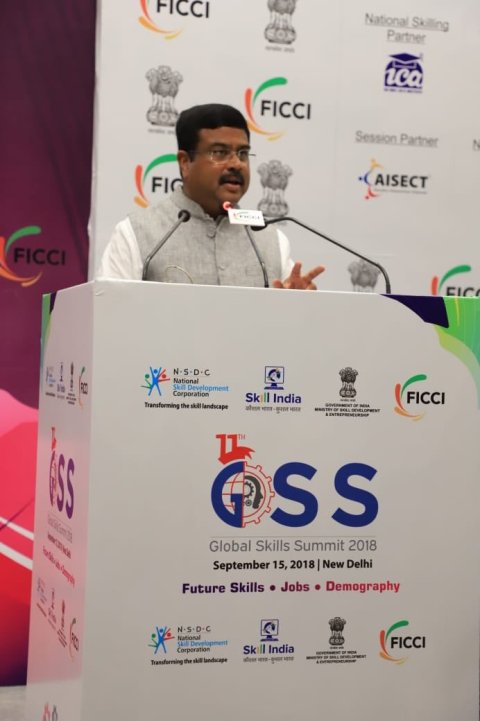Dharmendra Pradhan inaugurates the 11th Global Skills Summit
On the occasion, the Minister released two knowledge reports titled, 'Future of Jobs in India-2.0' and 'Employer-led Models of Job Creation- Version:2'.

- Country:
- India
Union Minister of Petroleum & Natural Gas and Skill Development & Entrepreneurship, Mr. Dharmendra Pradhan today called for a collective introspection on the changing nature of job profiles and urged those responsible for fashioning the public policy to zero in on the nature of future jobs and where they would be available. Internet, he said, was changing the character of the workplace at a frenetic pace, and therefore, policy shapers need to astutely comprehend the jobs scenario.
Inaugurating the 11th Global Skills Summit, 2018, organized by FICCI and the Ministry of Skill Development & Entrepreneurship, Mr. Pradhan said the belief that technology and innovation were squeezing the job space was a myth. While some jobs were being squeezed, a multi-fold increase was being witnessed in many other sectors due to technological innovation.
India, he said, was blessed with intellectual manpower, and the time was ripe to channelize this asset into the creation of gainful employment for the people endowed with the right type of skills.
On the occasion, the Minister released two knowledge reports titled, 'Future of Jobs in India-2.0' and 'Employer-led Models of Job Creation- Version:2'. The summit also witnessed the launch of initiatives such the future skills courses by NSDC; a digital platform for blue-collar skilling ecosystem by Betterplace and rural e-commerce distribution system by Connect India.
Earlier, Mr. Chandra Mohan Patowary, Minister of Skill, Employment & Entrepreneurship, Government of Assam, underscored the dire need to impart industry-oriented skills to the wave of young people who join the workforce each year. He stressed the importance of producing knowledgeable trainers to impart training to the youth in the emerging skill requirements of the country. Formal education, he said, was of little value in jobs of the future; it is the skills imbibed by the new entrants to the workforce that will stay with them and hold them in good stead.
Mr. Bijay Sahoo, Co-Chair, FICCI SDC & President, HR, Reliance Industries, said that jobs are being created in emerging technologies. "Healthcare and hospitality are creating the maximum number of jobs in the world," he added.
FICCI's 'Future of Jobs in India-2.0' proposes to analyze five more sectors in the second phase of the study that was conducted in 2017. These proposed sectors together form the foundation of India's socio-economic development. The sectors include Healthcare, Construction, Tourism & Hospitality, Education, and Transportation & Logistics. The proposed study will be an endeavor towards analyzing the five sectors in detail and presenting a holistic perspective on three counts: analyzing the major trends impacting the sectors, identifying the key skilling needs, and recommending a strategy towards developing the workforce of the future.
The report on 'Employer-led Models of Job Creation- Version:2', a FICCI Skill Development Committee Working Group Initiative, notes that with its demographic advantage and a new home-grown culture of start-ups, India aspires to become a global human resource hub. However, it will require a conscious effort on the part of the Government, Industry, Academia and all other key stakeholders to holistically engage with each other. It may help in targeting expenditure on initiatives, developing today's curriculum for tomorrow's workforce, adopting best practices from across the globe, bringing necessary changes in the regulation of FDIs and easy funding for new innovation and models of job creation.
It states that in this 21st-century world, India has the potential to lead the innovation and create better livelihood opportunities. This is possible only through an 'ENGAGE-ing' atmosphere, which can be captured as Ensuring Reskilling and Upskilling; Nurturing Young Talent; Government's thrust on better Policy Formation and Implementation; Academic-Industry Engagement; Going Global: Adopting Best Practices and Encouraging Entrepreneurship.










